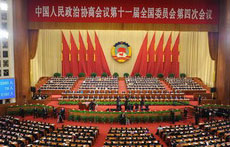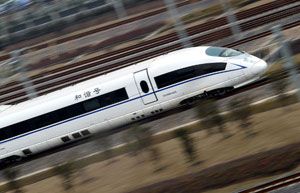China to make better life for migrant workers
By Wang Jingqiong (China Daily)
Updated: 2011-03-06 09:51
 |
|
From left to right: Cai Jiming, a senior leader of the China Association for Promoting Democracy and a sociology professor at Tsinghua University; Wang Jianlin, vice-chairman of the All-China Federation of Industry and Commerce; Qian Keming, a high-ranking official with the China Democratic League and director of the market and economic information department under the Ministry of Agriculture. [Photo by Feng Yongbin / China Daily] |
Beijing - China needs to take measures to address problems of migrant workers' welfare and illegal expropriation of rural land in the following years, or else China's urbanization drive could only end up in failure, said members of the Chinese People's Political Consultative Conference (CPPCC) National Committee at a news conference on Saturday.
Their remarks reflected the pledge Chinese Premier Wen Jiabao made on Saturday while outlining the focus of the government work this year.
| ||||
The premier said urbanization and agricultural modernization must be "mutually reinforcing".
Wang Jianlin, vice-chairman of the All-China Federation of Industry and Commerce, said that while China has gone through fast urbanization in the past 30 years, some severe problems remain.
Conferees discussed the situation of migrant workers, farmers who have come to work in cities but cannot enjoy the social welfare city citizens do because they do not have hukou, a necessity in many China's cities for enjoying equal medical, education, and housing policy.
It is estimated that China now has about 170 million migrant workers, and many of them have been living in cities for years.
"Migrant workers have contributed so much to China's modernization and development, now it is crucial to improve their treatment," said Cai Jiming, a senior leader of the China Association for Promoting Democracy and a sociology professor at Tsinghua University.
Both Wang and Cai said it will be right to let those migrant workers who have been in a city for more than half a year enjoy the same treatment as those with a city hukou.
In his work report, Wen pledged that China "will gradually make sure that rural migrant workers who have stable jobs and have lived in cities or towns for a number of years are registered as urban residents in line with local conditions and in a step-by-step manner."
However, for big cities like Beijing and Shanghai, where the pressure of population and housing is increasingly intimidating, the prospect of getting migrant workers the same treatment the locals enjoy is daunting.
Therefore, Wang said, urbanization in the next period should be focused on developing small- and medium-sized cities.
"The social welfare system, including education, healthcare and housing policies, should also be reformed to be fairer toward migrant workers," Cai said.
Another issue: declining rural land and angry farmers whose land has been forcibly expropriated without fair compensation.
Under Chinese law, rural land is divided into construction land and agricultural land, and agricultural land is not supposed to be rented out for commercial uses. That is intended to protect farmland and to assure the production of food.
Critics say many local governments and real estate developers have not used rural land for the public interest, and many villages have been turned into industrial hubs.
"That is illegal and against the country's policy," said Qian Keming, a high-ranking official with the China Democratic League and director of the market and economic information department under the Ministry of Agriculture.
"In addition, even agricultural land has been declining in recent years. It is worrisome as the worsening situation may endanger food safety."
Qian said the central government has launched reforms in the existing laws and regulations.
"Some farmers have lived in their villages for generations and they have ancestor halls there. If we do not respect their emotions but demolish their homes, it would only end up in more social conflicts," Qian said.
He said China should see how the fruits of urbanization can be equally divided, without sacrificing some groups' interests.




